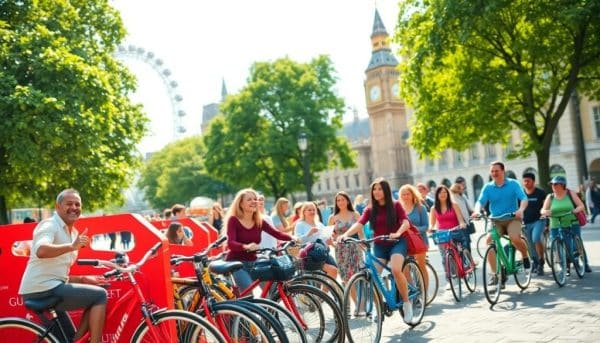The bike hire industry has transformed the way tourists explore the UK, offering an eco-friendly alternative for travel throughout its vibrant cities. As the demand for sustainable transportation continues to rise, understanding the impact of bike hire on the UK tourism industry is crucial for stakeholders and enthusiasts alike.
This article will delve into various aspects, including the effects of COVID-19 on bike hire demand, the benefits for tourists, and how bike hire contributes to sustainable tourism in the UK.
How has COVID-19 affected bike hire demand in the UK?
The COVID-19 pandemic drastically altered urban travel behavior in the UK. Initially, bike hire systems experienced a significant drop in usage, as lockdowns and health concerns kept many off the streets. However, as restrictions began to lift, there was a notable rebound in interest and usage of bike-sharing schemes like London's Santander Cycles.
This resurgence can be attributed to several factors. Firstly, people sought alternatives to public transportation, leading to a growth in micromobility solutions. Secondly, individuals began to prioritize outdoor activities, with cycling being a popular choice. Many tourists turned to bike hire as a way to safely explore urban areas, enhancing their overall travel experience.
Moreover, cities invested in cycling infrastructure, making it more accessible and attractive for both locals and visitors. The pandemic underscored the importance of sustainable transportation, paving the way for a more bike-friendly culture in the UK.
What are the benefits of bike hire for tourists in the UK?
Bike hire offers numerous advantages for tourists visiting the UK. One of the most significant benefits of bike hire for tourism in the UK is the enhanced flexibility it provides. Tourists can explore at their own pace, visiting attractions that may be off the beaten path.
- Cost-effective transportation: Renting a bike is often cheaper than using taxis or public transport.
- Health benefits: Cycling promotes physical activity, allowing tourists to stay active while exploring.
- Environmental consciousness: Opting for bike hire contributes to reducing carbon footprints, resonating with eco-conscious travelers.
- Cultural immersion: Biking through neighborhoods offers a more intimate experience of local culture.
Additionally, many bike hire schemes offer guided tours, combining sightseeing with the opportunity to learn about the area's history and culture. This not only enhances the tourist experience but also supports local businesses.
How does bike hire contribute to sustainable tourism in the UK?
Bike hire plays a vital role in advancing sustainable tourism in the UK. By promoting cycling as an alternative to car travel, bike-sharing schemes help in reducing traffic congestion and lowering greenhouse gas emissions. This aligns with the UK's commitment to environmental sustainability and climate change mitigation.
Furthermore, cities that embrace bike hire systems often see an increase in tourism-related activities. As more visitors opt for cycling, local businesses benefit from increased foot traffic and spending. This symbiotic relationship not only boosts the economy but also fosters community engagement.
What factors influence bike hire usage among tourists?
Several factors impact bike hire decisions among tourists in the UK. One significant aspect is the availability and accessibility of bike hire stations. A well-distributed network makes it easier for tourists to find and rent bikes, which enhances the overall experience.
Weather conditions also play a crucial role. For example, sunny days typically lead to higher bike hire numbers, while rain may deter potential cyclists. Public health concerns, especially in light of the ongoing pandemic, continue to influence tourists' decisions as well.
- Infrastructure: The presence of dedicated cycling lanes can encourage more tourists to consider bike hire.
- Public awareness: Marketing efforts that highlight the benefits of bike hire can increase participation.
- Pricing: Competitive pricing can make bike hire more appealing compared to other forms of transport.
Ultimately, understanding these factors is essential for bike hire companies aiming to attract tourists and contribute positively to the growing demand for sustainable travel options.
What are the future trends for bike hire in the UK?
The future of bike hire in the UK appears promising, with various trends shaping its potential growth. One of the most significant trends is the increasing integration of technology into bike-sharing schemes. Smartphone apps that allow users to locate, unlock, and pay for bike rentals are becoming more common.
Moreover, the rise of electric bikes (e-bikes) is changing the landscape of bike hire, making cycling more accessible for a broader range of tourists. E-bikes can appeal to those who may be less confident in their cycling abilities or prefer a more relaxed experience.
As cities continue to develop cycling infrastructure and promote urban mobility, bike hire schemes are likely to gain traction. This growth can be enhanced by partnerships with local tourism boards and businesses, creating a holistic approach to promoting cycling as a viable option for tourists.
How do weather conditions affect bike hire demand?
Weather conditions significantly influence bike hire demand in the UK. On sunny days, bike hire rates often spike, as tourists are more inclined to explore outdoor attractions. Conversely, rainy or cold weather tends to lead to a decline in bike rentals, as potential cyclists seek shelter from the elements.
Understanding seasonal weather patterns can help bike hire companies optimize their services. For instance, offering promotions during off-peak weather periods could encourage more usage, or providing appropriate gear for adverse conditions might entice tourists to ride regardless of the weather.
Additionally, cities can enhance their cycling infrastructure to mitigate the impact of weather. Providing sheltered bike parking or encouraging indoor bike rental stations can help maintain demand even during less favorable conditions.
Questions related to the impact of bike hire on UK tourism
How much does cycling contribute to the UK economy?
Cycling contributes significantly to the UK economy, with estimates suggesting it generates billions in revenue annually. This includes income from bike sales, rental schemes, and tourism activities associated with cycling. Furthermore, cycling-related events, such as races and festivals, attract visitors and stimulate local economies.
What impact did the bicycle have on other industries?
The bicycle has had a profound impact on various industries, including tourism, retail, and public health. It has influenced urban planning, pushing cities to create bike-friendly infrastructure, which in turn boosts local businesses and enhances community engagement.
How does cycling tourism help the economy?
Cycling tourism can be a substantial economic driver. It generates income for local businesses, increases job opportunities in the cycling industry, and promotes sustainable travel. Tourists who cycle tend to spend more on accommodation, food, and attractions, supporting the local economy.
How does the UK travel and tourism industry have an effect on the UK economy?
The travel and tourism industry is a vital part of the UK economy, contributing an estimated £200 billion each year. It supports millions of jobs and drives demand for local goods and services. As bike hire becomes an integral part of this industry, it further enhances economic benefits and promotes sustainable tourism.


Leave a Reply